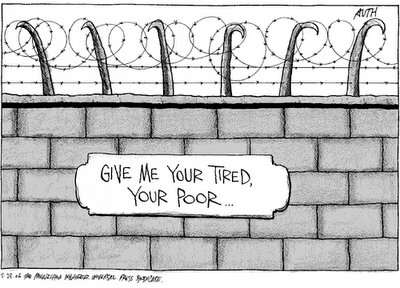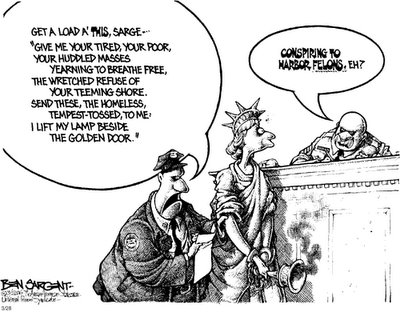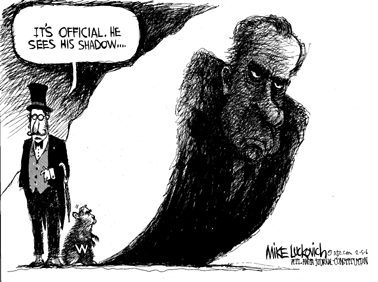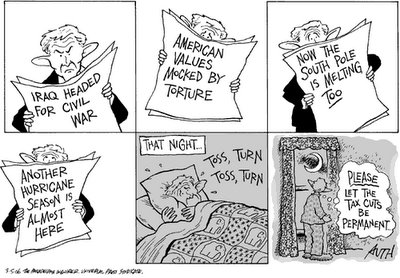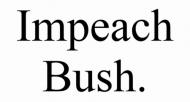Remembering the Iraq War's Pollyanna pundits

Weeks after thse invasion of Iraq began, Fox News Channel host Brit Hume delivered a scathing speech critiquing the media's supposedly pessimistic assessment of the Iraq War.
"The majority of the American media who were in a position to comment upon the progress of the war in the early going, and even after that, got it wrong," Hume complained in the April 2003 speech (Richmond Times Dispatch, 4/25/04). "They didn't get it just a little wrong. They got it completely wrong."
Hume was perhaps correct--but almost entirely in the opposite sense. Days or weeks into the war, commentators and reporters made premature declarations of victory, offered predictions about lasting political effects and called on the critics of the war to apologize. Three years later, the Iraq War grinds on at the cost of at least tens of thousands of lives and hundreds of billions of dollars.
Around the same time as Hume's speech, syndicated columnist Cal Thomas declared (4/16/03): "All of the printed and voiced prophecies should be saved in an archive. When these false prophets again appear, they can be reminded of the error of their previous ways and at least be offered an opportunity to recant and repent. Otherwise, they will return to us in another situation where their expertise will be acknowledged, or taken for granted, but their credibility will be lacking."
Gathered here are some of the most notable media comments from the early days of the Iraq War.
Declaring Victory
"Iraq Is All but Won; Now What?"
(Los Angeles Times headline, 4/10/03)
"Now that the combat phase of the war in Iraq is officially over, what begins is a debate throughout the entire U.S. government over America's unrivaled power and how best to use it."
(CBS reporter Joie Chen, 5/4/03)
"Congress returns to Washington this week to a world very different from the one members left two weeks ago. The war in Iraq is essentially over and domestic issues are regaining attention."
(NPR's Bob Edwards, 4/28/03)
"Tommy Franks and the coalition forces have demonstrated the old axiom that boldness on the battlefield produces swift and relatively bloodless victory. The three-week swing through Iraq has utterly shattered skeptics' complaints."
(Fox News Channel's Tony Snow, 4/13/03)
"The only people who think this wasn't a victory are Upper Westside liberals, and a few people here in Washington."
(Charles Krauthammer, Inside Washington, WUSA-TV, 4/19/03)
"We had controversial wars that divided the country. This war united the country and brought the military back."
(Newsweek's Howard Fineman--MSNBC, 5/7/03)
"We're all neo-cons now."
(MSNBC's Chris Matthews, 4/9/03)
"The war was the hard part. The hard part was putting together a coalition, getting 300,000 troops over there and all their equipment and winning. And it gets easier. I mean, setting up a democracy is hard, but it is not as hard as winning a war."
(Fox News Channel's Fred Barnes, 4/10/03)
"Oh, it was breathtaking. I mean I was almost starting to think that we had become inured to everything that we'd seen of this war over the past three weeks; all this sort of saturation. And finally, when we saw that it was such a just true, genuine expression. It was reminiscent, I think, of the fall of the Berlin Wall. And just sort of that pure emotional expression, not choreographed, not stage-managed, the way so many things these days seem to be. Really breathtaking."
(Washington Post reporter Ceci Connolly, appearing on Fox News Channel on 4/9/03, discussing the pulling down of a Saddam Hussein statue in Baghdad, an event later revealed to have been a U.S. military PSYOPS operation--Los Angeles Times, 7/3/04)
Mission Accomplished?
"The war winds down, politics heats up.... Picture perfect. Part Spider-Man, part Tom Cruise, part Ronald Reagan. The president seizes the moment on an aircraft carrier in the Pacific."
(PBS's Gwen Ifill, 5/2/03, on George W. Bush's "Mission Accomplished" speech)
"We're proud of our president. Americans love having a guy as president, a guy who has a little swagger, who's physical, who's not a complicated guy like Clinton or even like Dukakis or Mondale, all those guys, McGovern. They want a guy who's president. Women like a guy who's president. Check it out. The women like this war. I think we like having a hero as our president. It's simple. We're not like the Brits."
(MSNBC's Chris Matthews, 5/1/03)
"He looked like an alternatively commander in chief, rock star, movie star, and one of the guys."
(CNN's Lou Dobbs, on Bush's 'Mission Accomplished' speech, 5/1/03)
Neutralizing the Opposition
"Why don't the damn Democrats give the president his day? He won today. He did well today."
(MSNBC's Chris Matthews, 4/9/03)
"What's he going to talk about a year from now, the fact that the war went too well and it's over? I mean, don't these things sort of lose their--Isn't there a fresh date on some of these debate points?"
(MSNBC's Chris Matthews, speaking about Howard Dean--4/9/03)
"If image is everything, how can the Democratic presidential hopefuls compete with a president fresh from a war victory?"
(CNN's Judy Woodruff, 5/5/03)
"It is amazing how thorough the victory in Iraq really was in the broadest context..... And the silence, I think, is that it's clear that nobody can do anything about it. There isn't anybody who can stop him. The Democrats can't oppose--cannot oppose him politically."
(Washington Post reporter Jeff Birnbaum-- Fox News Channel, 5/2/03)
Nagging the "Naysayers"
"Now that the war in Iraq is all but over, should the people in Hollywood who opposed the president admit they were wrong?"
(Fox News Channel's Alan Colmes, 4/25/03)
"I doubt that the journalists at the New York Times and NPR or at ABC or at CNN are going to ever admit just how wrong their negative pronouncements were over the past four weeks."
(MSNBC's Joe Scarborough, 4/9/03)
"I'm waiting to hear the words 'I was wrong' from some of the world's most elite journalists, politicians and Hollywood types.... I just wonder, who's going to be the first elitist to show the character to say: 'Hey, America, guess what? I was wrong'? Maybe the White House will get an apology, first, from the New York Times' Maureen Dowd. Now, Ms. Dowd mocked the morality of this war....
"Do you all remember Scott Ritter, you know, the former chief U.N. weapons inspector who played chief stooge for Saddam Hussein? Well, Mr. Ritter actually told a French radio network that -- quote, 'The United States is going to leave Baghdad with its tail between its legs, defeated.' Sorry, Scott. I think you've been chasing the wrong tail, again.
"Maybe disgraced commentators and politicians alike, like Daschle, Jimmy Carter, Dennis Kucinich, and all those others, will step forward tonight and show the content of their character by simply admitting what we know already: that their wartime predictions were arrogant, they were misguided and they were dead wrong. Maybe, just maybe, these self-anointed critics will learn from their mistakes. But I doubt it. After all, we don't call them 'elitists' for nothing."
(MSNBC's Joe Scarborough, 4/10/03)
"Over the next couple of weeks when we find the chemical weapons this guy was amassing, the fact that this war was attacked by the left and so the right was so vindicated, I think, really means that the left is going to have to hang its head for three or four more years."
(Fox News Channel's Dick Morris, 4/9/03)
"This has been a tough war for commentators on the American left. To hope for defeat meant cheering for Saddam Hussein. To hope for victory meant cheering for President Bush. The toppling of Mr. Hussein, or at least a statue of him, has made their arguments even harder to defend. Liberal writers for ideologically driven magazines like The Nation and for less overtly political ones like The New Yorker did not predict a defeat, but the terrible consequences many warned of have not happened. Now liberal commentators must address the victory at hand and confront an ascendant conservative juggernaut that asserts United States might can set the world right."
(New York Times reporter David Carr, 4/16/03)
"Well, the hot story of the week is victory.... The Tommy Franks-Don Rumsfeld battle plan, war plan, worked brilliantly, a three-week war with mercifully few American deaths or Iraqi civilian deaths.... There is a lot of work yet to do, but all the naysayers have been humiliated so far.... The final word on this is, hooray."
(Fox News Channel's Morton Kondracke, 4/12/03)
"Some journalists, in my judgment, just can't stand success, especially a few liberal columnists and newspapers and a few Arab reporters."
(CNN's Lou Dobbs, 4/14/03)
"Sean Penn is at it again. The Hollywood star takes out a full-page ad out in the New York Times bashing George Bush. Apparently he still hasn't figured out we won the war."
(MSNBC's Joe Scarborough, 5/30/03)
Cakewalk?
"This will be no war -- there will be a fairly brief and ruthless military intervention.... The president will give an order. [The attack] will be rapid, accurate and dazzling.... It will be greeted by the majority of the Iraqi people as an emancipation. And I say, bring it on."
(Christopher Hitchens, in a 1/28/03 debate-- cited in the Observer, 3/30/03)
"I will bet you the best dinner in the gaslight district of San Diego that military action will not last more than a week. Are you willing to take that wager?"
(Fox News Channel's Bill O'Reilly, 1/29/03)
"It won't take weeks. You know that, professor. Our military machine will crush Iraq in a matter of days and there's no question that it will."
(Fox News Channel's Bill O'Reilly, 2/10/03)
"There's no way. There's absolutely no way. They may bomb for a matter of weeks, try to soften them up as they did in Afghanistan. But once the United States and Britain unleash, it's maybe hours. They're going to fold like that."
(Fox News Channel's Bill O'Reilly, 2/10/03)
"He [Saddam Hussein] actually thought that he could stop us and win the debate worldwide. But he didn't--he didn't bargain on a two- or three week war. I actually thought it would be less than two weeks."
(NBC reporter Fred Francis, Chris Matthews Show, 4/13/03)
Weapons of Mass Destruction
NPR's Mara Liasson: Where there was a debate about whether or not Iraq had these weapons of mass destruction and whether we can find it...
Brit Hume: No, there wasn't. Nobody seriously argued that he didn't have them beforehand. Nobody.
(Fox News Channel, April 6, 2003)
"Speaking to the U.N. Security Council last week, Secretary of State Colin Powell made so strong a case that Iraqi dictator Saddam Hussein is in material breach of U.N. resolutions that only the duped, the dumb and the desperate could ignore it."
(Cal Thomas, syndicated column, 2/12/03)
"Saddam could decide to take Baghdad with him. One Arab intelligence officer interviewed by Newsweek spoke of 'the green mushroom' over Baghdad--the modern-day caliph bidding a grotesque bio-chem farewell to the land of the living alongside thousands of his subjects as well as his enemies. Saddam wants to be remembered. He has the means and the demonic imagination. It is up to U.S. armed forces to stop him before he can achieve notoriety for all time."
(Newsweek, 3/17/03)
"Chris, more than anything else, real vindication for the administration. One, credible evidence of weapons of mass destruction. Two, you know what? There were a lot of terrorists here, really bad guys. I saw them."
(MSNBC reporter Bob Arnot, 4/9/03)
"Even in the flush of triumph, doubts will be raised. Where are the supplies of germs and poison gas and plans for nukes to justify pre-emption? (Freed scientists will lead us to caches no inspectors could find.) What about remaining danger from Baathist torturers and war criminals forming pockets of resistance and plotting vengeance? (Their death wish is our command.)"
(New York Times' William Safire, 4/10/03)

